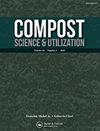污水污泥15天生物干燥过程中的有机降解及潜在微生物功能
IF 0.9
4区 农林科学
Q3 ECOLOGY
引用次数: 0
摘要
摘要为了应对污泥生成增加的挑战,需要缩短生物干燥期。这项研究评估了污水污泥生物干燥期缩短15 天。测定了不同阶段样品的基本物理化学性质,使用红外光谱鉴定了官能团,并根据基因数据库对生物干燥相关的微生物功能进行了注释。经过15天的生物干燥期后,水分含量、易降解碳水化合物、木质纤维素和蛋白质水平显著降低。通过红外光谱鉴定的峰的明显衰减表明,生物干燥基质中大多数脂质、蛋白质和多糖的降解在第15天达到平衡,并且在这种生物合成之后可能导致多糖含量增加。然而,生物干燥基质在第20天仅部分成熟。厚壁菌门、放线菌门和变形菌门是最具生态优势的门。这些生态优势微生物在生物干燥相关代谢途径(糖酵解、氨基糖和核苷酸糖代谢、淀粉和蔗糖代谢)中也具有功能优势,并含有碳水化合物活性酶家族。改良的15天生物干燥期减少了处理时间,并在不增加操作成本的情况下取得了良好的生物干燥效果。15天的治疗将提高现有系统的使用率或降低新系统的资本成本。本文章由计算机程序翻译,如有差异,请以英文原文为准。
The Organic Degradation and Potential Microbial Function in a 15-Day Sewage Sludge Biodrying
Abstract To meet the challenge of increased sludge generation, shortening of biodrying periods are required. This study assesses a shortened sewage sludge biodrying period of 15 days. The fundamental physicochemical properties of samples from different phases were determined, the functional groups were identified using infrared spectroscopy and the biodrying associated microbial functions were annotated against gene databases. After a 15-day biodrying period, the moisture content, readily degradable carbohydrate, lignocellulose and protein levels were significantly reduced. The distinct attenuation of peaks identified by infrared spectroscopy, indicates that the degradation of most lipids, proteins and polysaccharides in the biodrying matrix had reached equilibration on Day 15 and following this biosynthesis may result in an increased polysaccharide content. However, the biodrying matrix on Day 20 was only partially matured. Firmicutes, Actinobacteria and Proteobacteria were the most ecologically dominant phyla. These ecologically dominant microorganisms were also functionally dominant in biodrying associated metabolic pathways (glycolysis, amino sugar and nucleotide sugar metabolism, starch and sucrose metabolism), as well as containing carbohydrate-active enzyme families. The modified 15-day biodrying period reduced the treatment time and achieved a competent biodrying result without increasing the operating costs. The 15-day treatment would increase the rate of existing systems or decrease the capital cost of new systems.
求助全文
通过发布文献求助,成功后即可免费获取论文全文。
去求助
来源期刊

Compost Science & Utilization
农林科学-生态学
CiteScore
4.10
自引率
0.00%
发文量
0
审稿时长
>36 weeks
期刊介绍:
4 issues per year
Compost Science & Utilization is currently abstracted/indexed in: CABI Agriculture & Environment Abstracts, CSA Biotechnology and Environmental Engineering Abstracts, EBSCOhost Abstracts, Elsevier Compendex and GEOBASE Abstracts, PubMed, ProQuest Science Abstracts, and Thomson Reuters Biological Abstracts and Science Citation Index
 求助内容:
求助内容: 应助结果提醒方式:
应助结果提醒方式:


